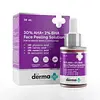What's inside
What's inside
 Key Ingredients
Key Ingredients

 Benefits
Benefits

 Concerns
Concerns

No concerns
 Ingredients Side-by-side
Ingredients Side-by-side

Water
Skin ConditioningNiacinamide
SmoothingTranexamic Acid
AstringentSqualane
EmollientPropanediol
SolventGlycerin
HumectantBetaine
HumectantVaccinium Angustifolium Fruit Extract
Skin ProtectingGlycyrrhiza Glabra Root Extract
BleachingCarica Papaya Fruit Extract
Skin ConditioningAlpha-Arbutin
AntioxidantSodium Hyaluronate
HumectantPhenoxyethanol
PreservativeEthylhexylglycerin
Skin ConditioningSodium Acrylates Copolymer
Lecithin
Emollient3-O-Ethyl Ascorbic Acid
Skin ConditioningSodium Benzoate
MaskingPotassium Sorbate
PreservativeXanthan Gum
EmulsifyingPanthenol
Skin ConditioningTocopheryl Acetate
AntioxidantWater, Niacinamide, Tranexamic Acid, Squalane, Propanediol, Glycerin, Betaine, Vaccinium Angustifolium Fruit Extract, Glycyrrhiza Glabra Root Extract, Carica Papaya Fruit Extract, Alpha-Arbutin, Sodium Hyaluronate, Phenoxyethanol, Ethylhexylglycerin, Sodium Acrylates Copolymer, Lecithin, 3-O-Ethyl Ascorbic Acid, Sodium Benzoate, Potassium Sorbate, Xanthan Gum, Panthenol, Tocopheryl Acetate
Water
Skin ConditioningGlycolic Acid
BufferingLactic Acid
BufferingMandelic Acid
AntimicrobialAloe Barbadensis Leaf Juice
Skin ConditioningPropylene Glycol
HumectantVaccinium Myrtillus Bud Extract
AntioxidantBeta Vulgaris Root Extract
Skin ConditioningSodium Hydroxide
BufferingSalicylic Acid
MaskingChamomilla Recutita Extract
Skin ConditioningCalendula Officinalis Flower Extract
MaskingPanthenol
Skin ConditioningSodium Hyaluronate
HumectantCamellia Sinensis Leaf Extract
AntimicrobialCucurbita Pepo Seed Extract
Skin ConditioningXanthan Gum
EmulsifyingPhenoxyethanol
PreservativeChlorphenesin
AntimicrobialSodium Benzoate
MaskingWater, Glycolic Acid, Lactic Acid, Mandelic Acid, Aloe Barbadensis Leaf Juice, Propylene Glycol, Vaccinium Myrtillus Bud Extract, Beta Vulgaris Root Extract, Sodium Hydroxide, Salicylic Acid, Chamomilla Recutita Extract, Calendula Officinalis Flower Extract, Panthenol, Sodium Hyaluronate, Camellia Sinensis Leaf Extract, Cucurbita Pepo Seed Extract, Xanthan Gum, Phenoxyethanol, Chlorphenesin, Sodium Benzoate
 Reviews
Reviews

Ingredients Explained
These ingredients are found in both products.
Ingredients higher up in an ingredient list are typically present in a larger amount.
Panthenol is a common ingredient that helps hydrate and soothe the skin. It is found naturally in our skin and hair.
There are two forms of panthenol: D and L.
D-panthenol is also known as dexpanthenol. Most cosmetics use dexpanthenol or a mixture of D and L-panthenol.
Panthenol is famous due to its ability to go deeper into the skin's layers. Using this ingredient has numerous pros (and no cons):
Like hyaluronic acid, panthenol is a humectant. Humectants are able to bind and hold large amounts of water to keep skin hydrated.
This ingredient works well for wound healing. It works by increasing tissue in the wound and helps close open wounds.
Once oxidized, panthenol converts to pantothenic acid. Panthothenic acid is found in all living cells.
This ingredient is also referred to as pro-vitamin B5.
Learn more about PanthenolPhenoxyethanol is a preservative that has germicide, antimicrobial, and aromatic properties. Studies show that phenoxyethanol can prevent microbial growth. By itself, it has a scent that is similar to that of a rose.
It's often used in formulations along with Caprylyl Glycol to preserve the shelf life of products.
Sodium Benzoate is a preservative. It's used in both cosmetic and food products to inhibit the growth of mold and bacteria. It is typically produced synthetically.
Both the US FDA and EU Health Committee have approved the use of sodium benzoate. In the US, levels of 0.1% (of the total product) are allowed.
Sodium benzoate works as a preservative by inhibiting the growth of bacteria inside of cells. It prevents the cell from fermenting a type of sugar using an enzyme called phosphofructokinase.
It is the salt of benzoic acid. Foods containing sodium benzoate include soda, salad dressings, condiments, fruit juices, wines, and snack foods.
Studies for using ascorbic acid and sodium benzoate in cosmetics are lacking, especially in skincare routines with multiple steps.
We always recommend speaking with a professional, such as a dermatologist, if you have any concerns.
Learn more about Sodium BenzoateSodium Hyaluronate is hyaluronic acid's salt form. It is commonly derived from the sodium salt of hyaluronic acid.
Like hyaluronic acid, it is great at holding water and acts as a humectant. This makes it a great skin hydrating ingredient.
Sodium Hyaluronate is naturally occurring in our bodies and is mostly found in eye fluid and joints.
These are some other common types of Hyaluronic Acid:
Learn more about Sodium HyaluronateWater. It's the most common cosmetic ingredient of all. You'll usually see it at the top of ingredient lists, meaning that it makes up the largest part of the product.
So why is it so popular? Water most often acts as a solvent - this means that it helps dissolve other ingredients into the formulation.
You'll also recognize water as that liquid we all need to stay alive. If you see this, drink a glass of water. Stay hydrated!
Learn more about WaterXanthan gum is used as a stabilizer and thickener within cosmetic products. It helps give products a sticky, thick feeling - preventing them from being too runny.
On the technical side of things, xanthan gum is a polysaccharide - a combination consisting of multiple sugar molecules bonded together.
Xanthan gum is a pretty common and great ingredient. It is a natural, non-toxic, non-irritating ingredient that is also commonly used in food products.
Learn more about Xanthan Gum